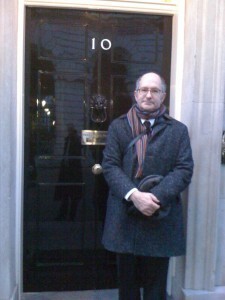Mr Brown Goes to the Palace
John Lanchester
Finally! The production we’ve all been waiting for, Mr Brown Goes to the Palace, has opened at last. There’s something very British about the way everyone has known for months that the election was going to be on 6 May, but that it’s only now that we officially know it.
This point is so obvious it tends to be overlooked, but in the last thirty years, the incumbent party has only lost the election once. There have been five wins for the party in government, one win for the challenger. That was in 1997, when John Major took the power to declare an election whenever he liked it to one extreme: it was declared on St Patrick’s Day, 17 March, and held on 1 May. That’s a full two weeks longer than the current campaign. Maybe Major thought that if the country had a long hard look at Blair, they would recoil in revulsion. He was right, in a way, it’s just that it took ten years for the effect to fully kick in.
The power to choose exactly when to have an election conveys a gigantic advantage to the incumbent. It’s one of the reasons incumbents now tend to win UK elections. There is no statutory framework for the timing, beyond the requirement to call it within five years of the last one. (Note, it doesn’t have to be held within five calendar years, only called.) We’re so used to this that we tend to forget how unusual it is, in the context of the democratic world’s electoral systems.
Brown had his chance to use the power of timing the election, in the autumn of 2007, and lost his nerve at the last moment. But he still has one absolutely gigantic factor in his favour this time, and that is the way Parliamentary seats are distributed. The Boundary Commission is independent and no one is accusing it of tweaking the system on behalf of the government, but the fact is that Labour have an enormous statistical advantage going into the election. The simple way of putting this is to say that votes in the country are worth less than votes in the city. That’s because the Boundary Commission has struggled to keep up with the historic drift of Britons out of cities into the country – a strange trend in a global context, since pretty much every other country in the world is moving the other way. The only hard figure I could find for the shift came from 2002, when a net 115,400 people moved out of the city – that’s a town the size of Exeter disappearing every year. The trend may even be accelerating. A study based on GP rolls found that 243,700 people left London in the 12 months to June 2006.
In general, those people are moving to the country, where they will find their vote counts for less. Country constituencies are bigger, in population as well as geographical terms, than urban ones; urban votes are disproportionately effective in winning seats. Because Labour’s support skews urban and the Conservatives’ skews rural, this translates into a big advantage for Labour. How big? Well, this non-partisan article from the House of Commons magazine, dating from 2006 when the election was a long way off, reckoned that the Tories needed to win the election by a margin of 10 per cent in order to have any majority at all.
By what Dame Edna would call a ‘spooky’ coincidence, ten per cent happens to be the Tories’ lead in the most recent YouGov poll. Normally, a lead of that size would translate into a huge Parliamentary win. (Blair in 2001 won a majority of 166 with a lead of 9 per cent.) But, I say again, the system is so weighted against the Tories that this is the minimum lead they need to feel confident about any majority at all. They’re not bleating in public about this, presumably because it would make them look like losers, but I bet it’s occupying a lot of thinking behind the scenes. The Tories won’t have forgotten one of the most amazing facts about the 2005 election. In England they actually beat Labour by 57,000 votes – but ended up with 93 fewer seats. That isn’t especially fair, but it should make things interesting.
